人教版(2019)必修 第一册Unit 3 Sports and fitness Discovering useful structures 附加疑问句课件(共19张PPT)
文档属性
| 名称 | 人教版(2019)必修 第一册Unit 3 Sports and fitness Discovering useful structures 附加疑问句课件(共19张PPT) |
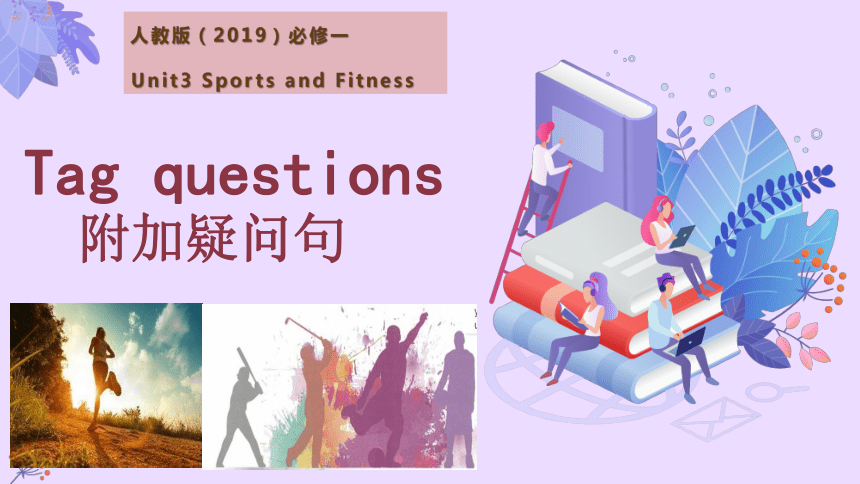
|
|
| 格式 | pptx | ||
| 文件大小 | 2.5MB | ||
| 资源类型 | 教案 | ||
| 版本资源 | 人教版(2019) | ||
| 科目 | 英语 | ||
| 更新时间 | 2023-11-10 00:00:00 | ||
图片预览

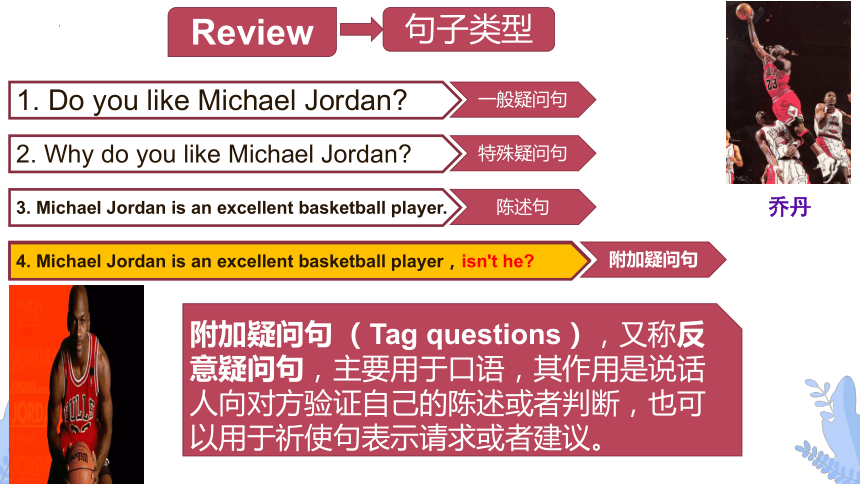
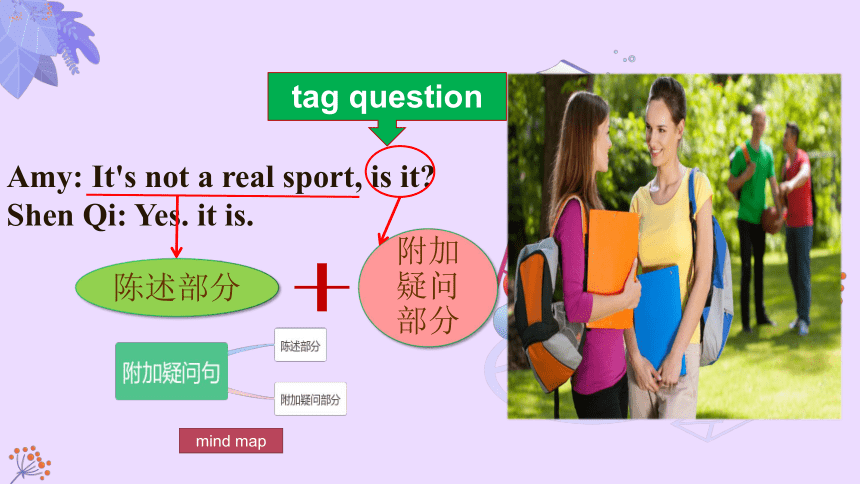
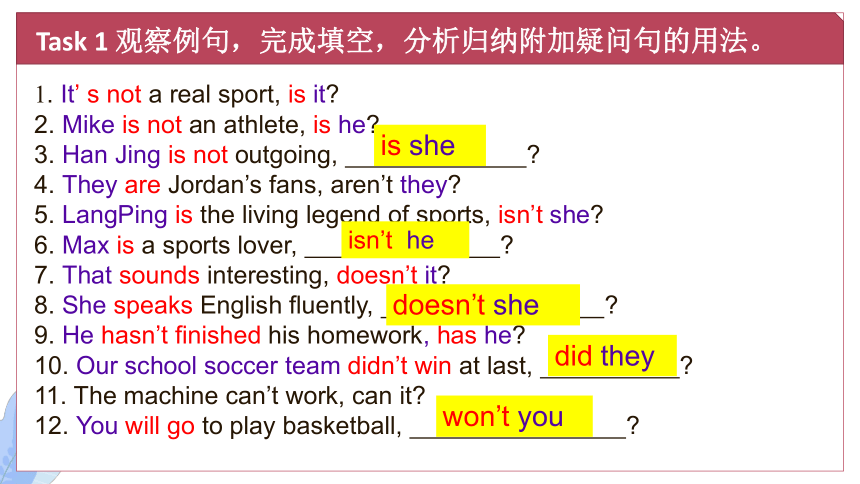
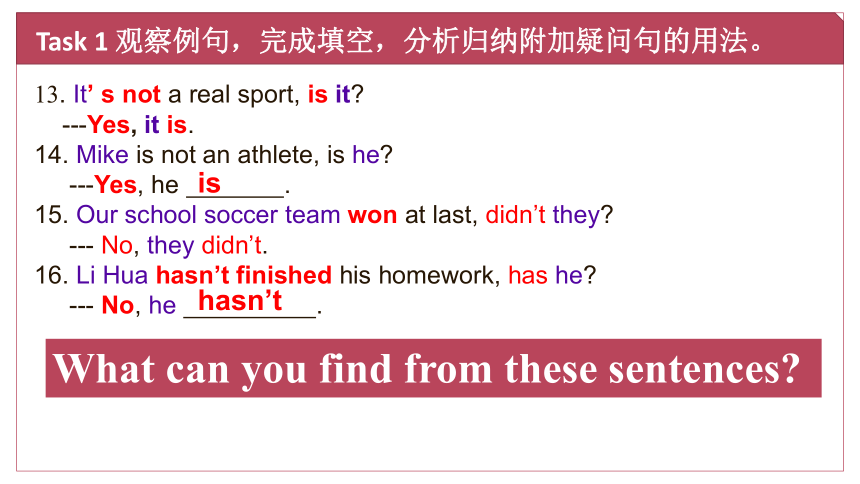
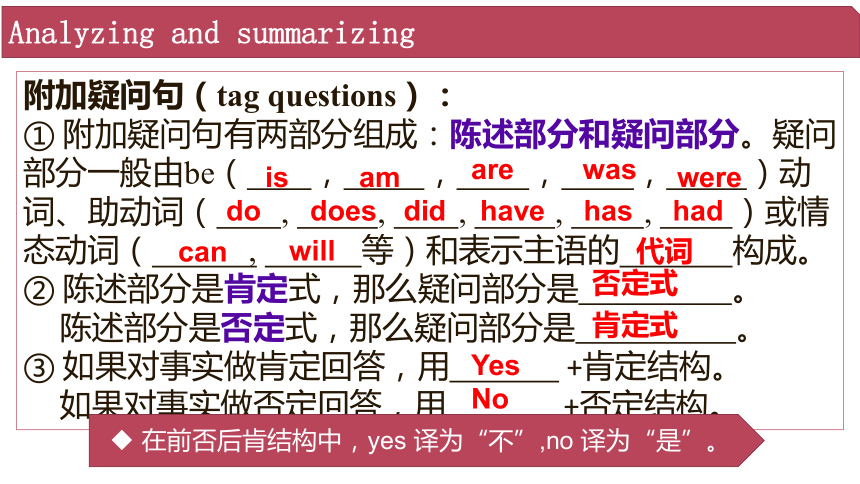
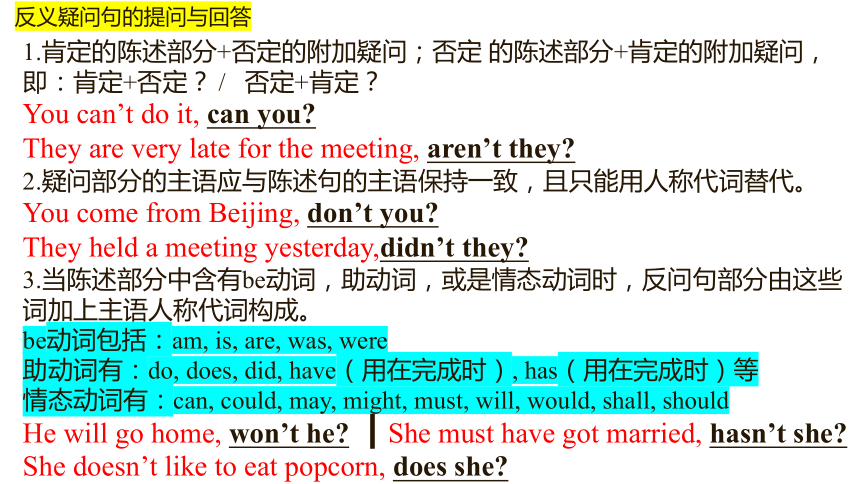
文档简介
(共19张PPT)
Tag questions
附加疑问句
人教版(2019)必修一
Unit3 Sports and Fitness
乔丹
Review
句子类型
1. Do you like Michael Jordan
一般疑问句
2. Why do you like Michael Jordan
特殊疑问句
3. Michael Jordan is an excellent basketball player.
陈述句
4. Michael Jordan is an excellent basketball player,isn't he
附加疑问句
附加疑问句 (Tag questions),又称反意疑问句,主要用于口语,其作用是说话人向对方验证自己的陈述或者判断,也可以用于祈使句表示请求或者建议。
4. Michael Jordan is an excellent basketball player,isn't he
Amy: It's not a real sport, is it
Shen Qi: Yes. it is.
tag question
陈述部分
附加疑问部分
mind map
Task 1 观察例句,完成填空,分析归纳附加疑问句的用法。
1. It’ s not a real sport, is it
2. Mike is not an athlete, is he
3. Han Jing is not outgoing,
4. They are Jordan’s fans, aren’t they
5. LangPing is the living legend of sports, isn’t she
6. Max is a sports lover,
7. That sounds interesting, doesn’t it
8. She speaks English fluently,
9. He hasn’t finished his homework, has he
10. Our school soccer team didn’t win at last,
11. The machine can’t work, can it
12. You will go to play basketball,
is she
isn’t he
doesn’t she
did they
won’t you
Task 1 观察例句,完成填空,分析归纳附加疑问句的用法。
13. It’ s not a real sport, is it
---Yes, it is.
14. Mike is not an athlete, is he
---Yes, he .
15. Our school soccer team won at last, didn’t they
--- No, they didn’t.
16. Li Hua hasn’t finished his homework, has he
--- No, he .
is
hasn’t
What can you find from these sentences
附加疑问句(tag questions):
① 附加疑问句有两部分组成:陈述部分和疑问部分。疑问部分一般由be( , , , , )动词、助动词( , , , , , )或情态动词( , 等)和表示主语的 构成。
② 陈述部分是肯定式,那么疑问部分是 。
陈述部分是否定式,那么疑问部分是 。
③ 如果对事实做肯定回答,用 +肯定结构。
如果对事实做否定回答,用 +否定结构。
Analyzing and summarizing
is
am
are
was
were
do
does
did
have
has
had
can
will
代词
否定式
肯定式
Yes
No
在前否后肯结构中,yes 译为“不”,no 译为“是”。
1.肯定的陈述部分+否定的附加疑问;否定 的陈述部分+肯定的附加疑问,即:肯定+否定? / 否定+肯定?
You can’t do it, can you
They are very late for the meeting, aren’t they
2.疑问部分的主语应与陈述句的主语保持一致,且只能用人称代词替代。
You come from Beijing, don’t you
They held a meeting yesterday,didn’t they
3.当陈述部分中含有be动词,助动词,或是情态动词时,反问句部分由这些词加上主语人称代词构成。
be动词包括:am, is, are, was, were
助动词有:do, does, did, have(用在完成时), has(用在完成时)等
情态动词有:can, could, may, might, must, will, would, shall, should
He will go home, won’t he ▎She must have got married, hasn’t she
She doesn’t like to eat popcorn, does she
反义疑问句的提问与回答
Translating and thinking
① -- It’s not a real sport, is it
-- Yes, it is.
② -- It’s not going to rain, is it
-- . It’s a good day for sports.
-- 这不是一项真正的体育运动,对吗?
-- 不,它是一项真正的体育运动。
-- 天不会下雨,对吧?
-- 是的,不会下雨。很适合运动的好天气。
附加疑问句的陈述部分为 时,回答要依据实际情况回答,即先按照实际写后面的答句,然后再根据前后一致原则写Yes 或 No。
例如:-- It’ s not a real sport, is it
-- , it (a real sport). (它是一项真正的体育运动。)
否定式
is
Yes
分析与总结
No, it isn’t
反义疑问句的回答
1.反义义疑问句的陈述部分为I am …时,问句部分习惯上用aren’t I?
I am a very honest man, aren’t I
I’m as tall as your brother,aren’t I
2.陈述部分的主语为不定代词somebody (someone), anybody (anyone), nobody (no one), everybody (everyone) none, neither时,问句部分的主语强调全体时用they,强调个体时用he。
Someone has taken the seat, hasn’t he
Everyone has done their best in the game, haven’t they
3.陈述部分的主语为不定代词something, anything, nothing, everything时,问句部分的主语用it。
Something is wrong with the computer, isn’t it
Nothing can stop you learning, can it
反义疑问句的特殊情况
反义疑问句的特殊情况
4.have表示不同含义时,疑问部分使用不同的动词:
(1)have 表“有”时,反义义疑问句谓语动词用have/do都可以
He has a new car, doesn’t/hasn’t he
She has a beautiful garden, hasn’t she /doesn’t she
(2)have表“吃,喝,玩,度过,举办”等时,反义疑问句动词用do
He has supper at home every day, doesn’t he
They had a good time in Beijing, didn’t they
4.have表示不同含义时,疑问部分使用不同的动词:
(3)have to表“不得不,必须”时,反义疑问句谓语动词用do
Kite has to help her mother, doesn’t she
(4)had better表“最好”时,反义疑问句谓语动词用 had
We had better go to school at once, hadn’t we
(5)have用在完成时中,反义疑问句谓语动词用 have
They have known the matter, haven’t they
5.(1)陈述部分带有little, few, never, hardly, seldom,nobody, nothing, no one, none, neither等否定意义的词时,问句部分用肯定式。
She never tells a lie, does she He was seldom late, was he
Few people knew the news, did they
(2)当陈述部分所含的否定词是通过加前缀或后缀构成的(即有un, dis-前缀、less-后缀等含有词缀而意思否定的词),当做肯定句处理,其后的疑问部分依然用否定结构。
It is unfair, isn’t it
He dislikes English, doesn’t he
6.陈述部分为There + be +主语时,问句部分用be动词+ there 。
There are two cakes on the plate, aren’t there
There is something wrong with my bike, isn’t there
7.陈述部分为祈使句时,疑问部分根据不同情况使用不同的情态动词:
(1)若为let’s引导, Let’s go home together, shall we
(2)若为let us/me引导, Let us stop to rest, will you
(3)若为否定祈使句,Don’t make any noise, will you
(4)若为肯定祈使句,疑问部分用will you 或won’t you 都可以
Please open the window, will you /won’t you
8.陈述部分的主语是指示代词this或that时,反义疑问句的主语用it,当陈述部分的主语是指示代词these或those时,其反义疑问句的主语用they。
This is a plane, isn’t it
These are grapes, aren’t they
9.当陈述部分有情态动词must,问句有4种情况:
(1)mustn’t表示“禁止,不可,不必”时,附加问句通常要用must。
You mustn’t stop your car here, must you
(2)must表示“有必要”时,附加问句通常要用needn’t。
They must finish the work today, needn’t they
(3)当must用来表示对现在的情况进行推测时,问句通常要根据must后面的动词采用相应的形式。
He must be good at English, isn’t he
She must be a good English teacher, isn’t she
10.当陈述部分谓语动词是need,且被用作实义动词时,其反意疑问句需用do的适当形式。若need 为情态动词,疑问部分用need构成。
We need to help them, don’t we
You needn’t go there, need you
11.陈述部分是主从复合句时,疑问部分主语通常与主句主语一致。
She said she would come tomorrow, didn’t she
但主句主语为第一人称I/We,谓语动词是think, believe, imagine, expect等时,反义疑问句主语常与从句主语一致,并注意还原否定转移,以确定疑问部分的形式。
I think he is a good student, isn’t he
I don’t think he will come, will he
12.当陈述句的谓语动词含有used to 时,附加疑问句部分的谓语动词可以用din’t 或usedn’t
He used to swim in this river, didn’t he /usedn’t he
Practice
1.He used to get up late,____________________
2.I don’t think that he can finish the work,________________
3.—I don’t think that Mary is honest,________________
— _______,_______ _________.She often tells lies.
4.Mary thinks that you will come to the party,______________
5.She ought to know how to finish her work in time,
________________
didn’t he /usedn’t he
can he
is she
No she isn’t
does she
oughtn’t she / shouldn’t she
Task 2 Complete the conversations with appropriate tag questions or correct answers. Then act them out.
1. A: It’ s not going to rain, is it
B: . It’ s a good day for sports.
A: Then we can play football,
B: . We don’t have a ball.
2. A: It’s Sports Day next Thursday,
B: You’ re right, it is. Let’ s ask Xia Lei if she wants to join a team.
A: She likes soccer,
B: . But she loves volleyball. She could be in the volleyball team.
3. A: It’ s time for badminton class. Where is the coach He’ s late,
B: It’ s been 10 minutes already. He isn’t coming,
A: Cool! We can have a good time. That’s great!
B: Shh!
A: Oh no, he’ s right behind me,
B: Yes, I am!
No, it isn’t
can’t we
No, we can’t
isn’t it
doesn’t she
No, she doesn’t
isn’t she
is he
isn’t he
Pracitce
练一练
Page 40
Task3 Complete the conversation with appropriate tag questions.
Tom: Mum, I can have one more burger,
Mum: No, you can’t. You’ve already had two!
But you can have some yoghurt. Oh, what’s that noise
Dad: It isn’t a storm coming,
Tom: Yes, it is! But it’s on TV!
Dad, come and see,
Dad: What movie are you watching
Tom: The Day after Tomorrow.
Mum: Let’ s watch it together,
Family time!
Dad: Good idea!
Page 85
can’t I
is it
will / won’t you
shall we
陈述部分为祈使句的附加疑问句, 疑问部分通常用will you。
当祈使句为Let’s…时,疑问部分总是用 shall we。
祈使句
Thank you
Tag questions
附加疑问句
人教版(2019)必修一
Unit3 Sports and Fitness
乔丹
Review
句子类型
1. Do you like Michael Jordan
一般疑问句
2. Why do you like Michael Jordan
特殊疑问句
3. Michael Jordan is an excellent basketball player.
陈述句
4. Michael Jordan is an excellent basketball player,isn't he
附加疑问句
附加疑问句 (Tag questions),又称反意疑问句,主要用于口语,其作用是说话人向对方验证自己的陈述或者判断,也可以用于祈使句表示请求或者建议。
4. Michael Jordan is an excellent basketball player,isn't he
Amy: It's not a real sport, is it
Shen Qi: Yes. it is.
tag question
陈述部分
附加疑问部分
mind map
Task 1 观察例句,完成填空,分析归纳附加疑问句的用法。
1. It’ s not a real sport, is it
2. Mike is not an athlete, is he
3. Han Jing is not outgoing,
4. They are Jordan’s fans, aren’t they
5. LangPing is the living legend of sports, isn’t she
6. Max is a sports lover,
7. That sounds interesting, doesn’t it
8. She speaks English fluently,
9. He hasn’t finished his homework, has he
10. Our school soccer team didn’t win at last,
11. The machine can’t work, can it
12. You will go to play basketball,
is she
isn’t he
doesn’t she
did they
won’t you
Task 1 观察例句,完成填空,分析归纳附加疑问句的用法。
13. It’ s not a real sport, is it
---Yes, it is.
14. Mike is not an athlete, is he
---Yes, he .
15. Our school soccer team won at last, didn’t they
--- No, they didn’t.
16. Li Hua hasn’t finished his homework, has he
--- No, he .
is
hasn’t
What can you find from these sentences
附加疑问句(tag questions):
① 附加疑问句有两部分组成:陈述部分和疑问部分。疑问部分一般由be( , , , , )动词、助动词( , , , , , )或情态动词( , 等)和表示主语的 构成。
② 陈述部分是肯定式,那么疑问部分是 。
陈述部分是否定式,那么疑问部分是 。
③ 如果对事实做肯定回答,用 +肯定结构。
如果对事实做否定回答,用 +否定结构。
Analyzing and summarizing
is
am
are
was
were
do
does
did
have
has
had
can
will
代词
否定式
肯定式
Yes
No
在前否后肯结构中,yes 译为“不”,no 译为“是”。
1.肯定的陈述部分+否定的附加疑问;否定 的陈述部分+肯定的附加疑问,即:肯定+否定? / 否定+肯定?
You can’t do it, can you
They are very late for the meeting, aren’t they
2.疑问部分的主语应与陈述句的主语保持一致,且只能用人称代词替代。
You come from Beijing, don’t you
They held a meeting yesterday,didn’t they
3.当陈述部分中含有be动词,助动词,或是情态动词时,反问句部分由这些词加上主语人称代词构成。
be动词包括:am, is, are, was, were
助动词有:do, does, did, have(用在完成时), has(用在完成时)等
情态动词有:can, could, may, might, must, will, would, shall, should
He will go home, won’t he ▎She must have got married, hasn’t she
She doesn’t like to eat popcorn, does she
反义疑问句的提问与回答
Translating and thinking
① -- It’s not a real sport, is it
-- Yes, it is.
② -- It’s not going to rain, is it
-- . It’s a good day for sports.
-- 这不是一项真正的体育运动,对吗?
-- 不,它是一项真正的体育运动。
-- 天不会下雨,对吧?
-- 是的,不会下雨。很适合运动的好天气。
附加疑问句的陈述部分为 时,回答要依据实际情况回答,即先按照实际写后面的答句,然后再根据前后一致原则写Yes 或 No。
例如:-- It’ s not a real sport, is it
-- , it (a real sport). (它是一项真正的体育运动。)
否定式
is
Yes
分析与总结
No, it isn’t
反义疑问句的回答
1.反义义疑问句的陈述部分为I am …时,问句部分习惯上用aren’t I?
I am a very honest man, aren’t I
I’m as tall as your brother,aren’t I
2.陈述部分的主语为不定代词somebody (someone), anybody (anyone), nobody (no one), everybody (everyone) none, neither时,问句部分的主语强调全体时用they,强调个体时用he。
Someone has taken the seat, hasn’t he
Everyone has done their best in the game, haven’t they
3.陈述部分的主语为不定代词something, anything, nothing, everything时,问句部分的主语用it。
Something is wrong with the computer, isn’t it
Nothing can stop you learning, can it
反义疑问句的特殊情况
反义疑问句的特殊情况
4.have表示不同含义时,疑问部分使用不同的动词:
(1)have 表“有”时,反义义疑问句谓语动词用have/do都可以
He has a new car, doesn’t/hasn’t he
She has a beautiful garden, hasn’t she /doesn’t she
(2)have表“吃,喝,玩,度过,举办”等时,反义疑问句动词用do
He has supper at home every day, doesn’t he
They had a good time in Beijing, didn’t they
4.have表示不同含义时,疑问部分使用不同的动词:
(3)have to表“不得不,必须”时,反义疑问句谓语动词用do
Kite has to help her mother, doesn’t she
(4)had better表“最好”时,反义疑问句谓语动词用 had
We had better go to school at once, hadn’t we
(5)have用在完成时中,反义疑问句谓语动词用 have
They have known the matter, haven’t they
5.(1)陈述部分带有little, few, never, hardly, seldom,nobody, nothing, no one, none, neither等否定意义的词时,问句部分用肯定式。
She never tells a lie, does she He was seldom late, was he
Few people knew the news, did they
(2)当陈述部分所含的否定词是通过加前缀或后缀构成的(即有un, dis-前缀、less-后缀等含有词缀而意思否定的词),当做肯定句处理,其后的疑问部分依然用否定结构。
It is unfair, isn’t it
He dislikes English, doesn’t he
6.陈述部分为There + be +主语时,问句部分用be动词+ there 。
There are two cakes on the plate, aren’t there
There is something wrong with my bike, isn’t there
7.陈述部分为祈使句时,疑问部分根据不同情况使用不同的情态动词:
(1)若为let’s引导, Let’s go home together, shall we
(2)若为let us/me引导, Let us stop to rest, will you
(3)若为否定祈使句,Don’t make any noise, will you
(4)若为肯定祈使句,疑问部分用will you 或won’t you 都可以
Please open the window, will you /won’t you
8.陈述部分的主语是指示代词this或that时,反义疑问句的主语用it,当陈述部分的主语是指示代词these或those时,其反义疑问句的主语用they。
This is a plane, isn’t it
These are grapes, aren’t they
9.当陈述部分有情态动词must,问句有4种情况:
(1)mustn’t表示“禁止,不可,不必”时,附加问句通常要用must。
You mustn’t stop your car here, must you
(2)must表示“有必要”时,附加问句通常要用needn’t。
They must finish the work today, needn’t they
(3)当must用来表示对现在的情况进行推测时,问句通常要根据must后面的动词采用相应的形式。
He must be good at English, isn’t he
She must be a good English teacher, isn’t she
10.当陈述部分谓语动词是need,且被用作实义动词时,其反意疑问句需用do的适当形式。若need 为情态动词,疑问部分用need构成。
We need to help them, don’t we
You needn’t go there, need you
11.陈述部分是主从复合句时,疑问部分主语通常与主句主语一致。
She said she would come tomorrow, didn’t she
但主句主语为第一人称I/We,谓语动词是think, believe, imagine, expect等时,反义疑问句主语常与从句主语一致,并注意还原否定转移,以确定疑问部分的形式。
I think he is a good student, isn’t he
I don’t think he will come, will he
12.当陈述句的谓语动词含有used to 时,附加疑问句部分的谓语动词可以用din’t 或usedn’t
He used to swim in this river, didn’t he /usedn’t he
Practice
1.He used to get up late,____________________
2.I don’t think that he can finish the work,________________
3.—I don’t think that Mary is honest,________________
— _______,_______ _________.She often tells lies.
4.Mary thinks that you will come to the party,______________
5.She ought to know how to finish her work in time,
________________
didn’t he /usedn’t he
can he
is she
No she isn’t
does she
oughtn’t she / shouldn’t she
Task 2 Complete the conversations with appropriate tag questions or correct answers. Then act them out.
1. A: It’ s not going to rain, is it
B: . It’ s a good day for sports.
A: Then we can play football,
B: . We don’t have a ball.
2. A: It’s Sports Day next Thursday,
B: You’ re right, it is. Let’ s ask Xia Lei if she wants to join a team.
A: She likes soccer,
B: . But she loves volleyball. She could be in the volleyball team.
3. A: It’ s time for badminton class. Where is the coach He’ s late,
B: It’ s been 10 minutes already. He isn’t coming,
A: Cool! We can have a good time. That’s great!
B: Shh!
A: Oh no, he’ s right behind me,
B: Yes, I am!
No, it isn’t
can’t we
No, we can’t
isn’t it
doesn’t she
No, she doesn’t
isn’t she
is he
isn’t he
Pracitce
练一练
Page 40
Task3 Complete the conversation with appropriate tag questions.
Tom: Mum, I can have one more burger,
Mum: No, you can’t. You’ve already had two!
But you can have some yoghurt. Oh, what’s that noise
Dad: It isn’t a storm coming,
Tom: Yes, it is! But it’s on TV!
Dad, come and see,
Dad: What movie are you watching
Tom: The Day after Tomorrow.
Mum: Let’ s watch it together,
Family time!
Dad: Good idea!
Page 85
can’t I
is it
will / won’t you
shall we
陈述部分为祈使句的附加疑问句, 疑问部分通常用will you。
当祈使句为Let’s…时,疑问部分总是用 shall we。
祈使句
Thank you
